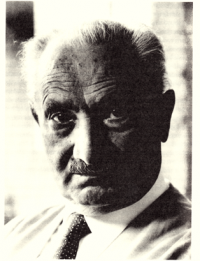Heidegger
From Geography
Martin Heidegger (Messkirch, 26 september 1889 - Freiburg im Breisgau, 26 mei 1976) was a German philosopher and is seen as one of the most influential philosophers of the 20th century. He was seen as quite a controversial person. Not only as an academic, but also because of his involvement with Nazism. Heidegger studied at the Freiburg University and became a junior collegea of Edmund Husserl in 1916. In 1919 Heidegger became Husserl's assistant but he did not became Husserl's follower. He dramaticly reinterpretated husserl's phenomenology and in 1927 he published his most famous work: Being and time[1]. From this moment on the reinterpretation of husserl's phenomenology became the most apparent (Korab-Karpowicz, 2001). For a full biography and bibliography see [2].
Heidegger was a philosopher who's thinking contributed to diverse fields such as Existentialism, Phenomenology and Hermeneutics (Korab-Karpowicz, 2001). But his main interest lies in the question of human existence, the relationship between human being and the world. His most well known attribution to the 20th century philosophy is the disctinction between 'Being' and 'Dasein'. His theory about Being started with the observation that philosophy over the years has paid attention to all things that can be found in our world. Heidegger introduced the 'question of being' about what being actually is.
Edmund Husserl argued that all philosophy should be a description of experience. For Heidegger this meant understanding that experience is already situated in a world, an ontological [3] approach of things. Heidegger argues that to describe experience properly, one should find the being for whom such a description matters. For this he introduces the term Dasein, the being for whom being is a question. Dasein is the condition for the possibility for anything like a philosophical anthropology. So Dasein is Being in an ontological sense.
Usefull links
References
- Cloke, P., Philo, C. & Sadler, D. (1999). Approaching Human Geography. London: Paul Chapman.
- Malpas, J. (2008). Heidegger, geography and politics. Journal of the Philosophy of History, 2 (185-213).
- Korab-Karpowicz, W. J. (2001). Martin Heidegger (1889-1976). Found 8 september 2011, on http://www.iep.utm.edu/heidegge/#H3
Contributors
- Published by Evelien de Beer & Richard Huttinga
- Edited by --JornJoosten 19:32, 8 September 2011 (UTC) & Loek Freulich
- Page slightly enhanced by Iris van der Wal - 14:30, October 21st 2012
- Picture added by Isis Boot --IsisBoot - 21:00, 24 October 2012 (CEST)
- Page added to Category 'Phenomenology' by Iris van der Wal - 16:03, October 25th 2012
